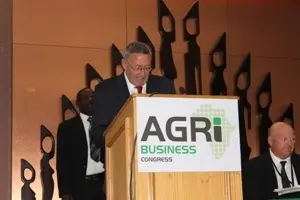Zambia’s agricultural sector has the potential to feed 200 million people in the wider region due to its abundant land and water resources, as well as its border links with eight southern African countries, which provide it with huge potential access to regional agricultural commodities markets
This was the message conveyed to delegates at the AgriBusiness Congress Zambia, held in Lusaka in early September 2012. The event was opened by the country’s vice-president, Guy Scott, with deputy minister of agriculture and livestock, Luxon Kazabu, delivering one of the conference's keynote address.
"The Zambian economy has shown remarkable resilience to the global economic downturn, and the policies being put in place by the recently-elected new government promises to add value to the agricultural industry and create investment," said AgriBusiness Congress programme director Claire O’Connell.
"Zambia is well positioned to benefit from the investment into developing and expanding its existing commercial farming and agribusiness sector and leverage the inclusion of its emerging small-scale farming sector in commercial agribusiness value chains."
The inaugural event consisted of a conference that attracted more than 200 delegates from 11 countries, which examined critical issues surrounding regional trade including the role of the private sector, infrastructure development and access to finance.
Themed 'Growing Zambian Economic Development through Agribusiness', the event was tailored to encourage unity, enhance cooperation and ensure Zambian agriculture was positioned to take advantage of the opportunities presented by the growth of the sector both domestically and internationally.
Various workshops were aimed at bringing more small farmers into the commercial farming net and provide business matchmaking opportunities between project developers, agriculture investor and traders in the region, in addition to exposing Zambian farmers to export markets.
Standard Bank head of agriculture Mohit Arora, who spoke at the event, said African agriculture was expected to feature as one of the major driving forces in the continent’s economic resurgence driven by an increasing affluent population.
Arora stated, "Africa has seen an increase in private equity companies that are investing aggressively in the agricultural sector with more than 45 private equity investors targeting the agricultural value chain.
"Regarding the agricultural output, the opportunity is immense and we could see a doubling of African agricultural output in the next decade," he added. "Demand for upstream products linked to the broader agribusiness sector will result in creating new opportunities for African and international enterprises."
Dr Chungu Mwila, CEO of the Alliance for Commodity Trade in Eastern and Southern Africa (ACTESA), said before the event, "Zambia as a host country stands to benefit from this opportunity to showcase the potential the country has in the agribusiness sector in the region, given its favourable climate, geographical location and land-linked nature, as well as its social-economic and political stability.
"This interaction will culminate in forging public private partnerships and contracts among the participants and also stimulating production of various agro-products due to market linkages that will result."
Zambia National Farmers Union (ZNFU) President Jervis Zimba asserted that the country's agriculture and agribusiness development opportunities were being further fuelled by Zambia's "endearing democratic dispensation, peace and unity".
"Liberalised market policies and a sustained macro-economic growth for decades now also fortify Zambia’s agricultural potential," Zimba commented.
Hosted by Spintelligent of South Africa in association with the ZNFU, the event attracted the support of a number of leading names within the global and regional agricultural market, including the likes of John Deere, Cargill, Reinke, Seedco, Zambeef and Standard Bank.
Nawa Mutumweno





